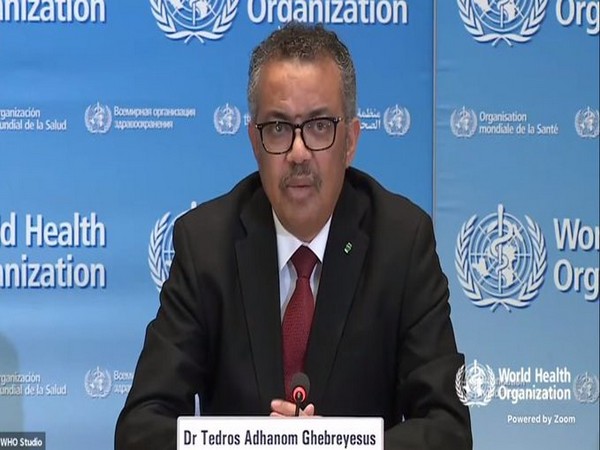Health News Roundup: Merck, Eisai to discontinue late-stage study for skin cancer; China holds the key to understanding COVID-19 origins: WHO chief and more
The decision to discontinue the trial was based on the recommendation of an independent data monitoring committee after an interim analysis, the companies said. Pfizer RSV vaccine 82% effective vs severe infection in infants, final data shows (April 5) Pfizer Inc's experimental respiratory syncytial virus (RSV) vaccine was 82% effective in preventing severe infections in infants when given to expecting mothers in the second half of their pregnancy, according to trial details published on Wednesday that confirm preliminary data from the study.

Following is a summary of current health news briefs.
Merck, Eisai to discontinue late-stage study for skin cancer
Merck & Co Inc and Eisai Co Ltd said on Friday they were discontinuing a late-stage study of Keytruda plus Lenvima for the treatment of adults with unresectable or metastatic melanoma, as the trial did not show improvement in overall survival. The decision to discontinue the trial was based on the recommendation of an independent data monitoring committee after an interim analysis, the companies said.
China holds the key to understanding COVID-19 origins: WHO chief
The World Health Organization chief pressed China on Thursday to share its information about the origins of COVID-19, saying that until that happened all hypotheses remained on the table, more than three years after the virus first emerged. "Without full access to the information that China has, you cannot say this or that," said Director-General Tedros Adhanom Ghebreyesus in response to a question about the origin of the virus.
Pfizer RSV vaccine 82% effective vs severe infection in infants, final data shows (April 5)
Pfizer Inc's experimental respiratory syncytial virus (RSV) vaccine was 82% effective in preventing severe infections in infants when given to expecting mothers in the second half of their pregnancy, according to trial details published on Wednesday that confirm preliminary data from the study. Final data from the study that was halted early when it became clear the vaccine was effective was published in the New England Journal of Medicine.
US FDA withdraws approval for Covis Pharma's preterm birth prevention drug
The U.S. Food and Drug Administration (FDA) on Thursday withdrew its approval for Covis Pharma's preterm birth prevention drug, Makena, saying that the drug was not effective in treating the complication. The U.S. health regulator has been pushing to withdraw the drug since 2020 but Covis insisted that the FDA wait for data from another confirmatory study and narrow its use in the meantime.
UK to offer COVID-19 vaccines for young children with medical conditions
Children aged between six months to four years with underlying medical conditions will be offered COVID-19 shots, Britain's vaccine advisers said on Thursday. The Joint Committee on Vaccination and Immunisation (JCVI) said eligible children should be offered two doses of the vaccine, with an interval of eight to 12 weeks between the first and second doses.
COVID caused brain damage in 2 infants infected during pregnancy -US study
Researchers at the University of Miami reported on Thursday what they believe are the first two confirmed cases in which the SARS-CoV-2 virus crossed a mother's placenta and caused brain damage in the infants they were carrying. Doctors previously had suspected this was possible, but until now, there was no direct evidence of COVID-19 in a mother's placenta or an infant's brain, the team told reporters at a news briefing.
India asks states to ramp up testing as COVID-19 cases climb
India's federal government asked states to identify emergency hotspots and ramp up-testing for COVID-19, after the country recorded its highest daily case count since September, a Reuters tally showed on Friday. There were 6,050 new cases of COVID-19 in the last 24 hours, the federal health ministry said on Friday, continuing a sharp upward trend since a lull last year.
RSV cases in US show signs of return to pre-pandemic seasonality - CDC
Respiratory syncytial virus (RSV) circulation is showing signs of return to pre-pandemic seasonality in the U.S. after two years of irregular onsets and peaks, the Centers for Disease Control and Prevention (CDC) said on Thursday. Typically, cases of RSV virus that can cause severe illness or death in the very young and old rose in October before waning in April. But during the two years of the COVID-19 pandemic, the circulation pattern changed.
Analysis-Texas abortion pill ruling could disrupt U.S. drug oversight
A federal judge in Texas could soon order the U.S. Food and Drug Administration to withdraw its approval of abortion pill mifepristone, a move that if allowed to stand could severely undermine the agency, health policy and legal experts said. The closely followed case could potentially lead to a nationwide ban on mifepristone - part of a two-drug regimen that accounts for more than half of U.S. abortions - and call into question the FDA's power to regulate all drugs nationwide, they said.
JNJ, AbbVie plan to pull US accelerated approvals for some blood cancer treatments
AbbVie Inc and partner Johnson & Johnson intend to voluntarily withdraw the accelerated approvals of their Imbruvica drug in the U.S. for patients with certain types of blood cancer, the companies said on Thursday. The U.S. Food and Drug Administration (FDA) advised that the primary outcomes from late-stage studies of the drug for the indications were considered insufficient to support conversion to full approval, J&J said.










